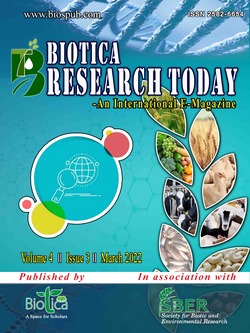
Land Degradation Neutrality
Shaon Kumar Das*
ICAR-Research Complex for NEH Region, Sikkim Centre, Gangtok, Sikkim (737 102), India
Sita Kumari Prasad
ICAR-Research Complex for NEH Region, Sikkim Centre, Gangtok, Sikkim (737 102), India
Ramgopal Laha
ICAR-Research Complex for NEH Region, Sikkim Centre, Gangtok, Sikkim (737 102), India
Vinay Kumar Mishra
ICAR-Research Complex for NEH Region, Umiam, Meghalaya (737 102), India
DOI: NIL
Keywords: Eroded, Land degradation neutrality, Land productivity, Soil health
Abstract
Land is being degraded rapidly worldwide. Ensuring food security for a growing global population requires healthy land resources and flourishing ecosystems. Yet our current agricultural practices are causing soils worldwide to be eroded up to 100 times faster than natural processes replenish them. At current rates, 90 percent of land will bear our imprint by 2050. The impacts of land degradation will be felt by most of the world’s population. LDN provides significant benefits in terms of mitigation and adaptation to climate change. Halting and reversing land degradation can transform land from being a source of greenhouse gas emissions to a carbon sink, by increasing carbon stocks in soils and vegetation. Restoration of land can start a virtuous cycle of good soil health, increased land productivity, food security and improved livelihoods. It is mankind’s collective responsibility to reverse the damage to land caused by human activities.
Downloads
not found
Reference
Mukherjee, I., Das, S.K., Kumar, A., 2018. Atmospheric CO2 level and temperature affect degradation of pretilachlor and butachlor in Indian Soil. Bulletin of Environmental Contamination and Toxicology 100(6), 856-861.
Qadir, M., Quillérou, E., Nangia, V., Murtaza, G., Singh, M., Thomas, R.J., Drechsel, P., Noble, A.D., 2014. Economics of Salt-induced Land Degradation and Restoration. Natural Resources Forum 38(4), 282–295. DOI: 10.1111/1477-8947.12054
Reddy, R., 2003. Land degradation in India: extent, costs and determinants. Economic and Political Weekly 38, 4700-4713.
United Nations (UN), 2015. Resolution adopted by the General Assembly on 3 June 2015. 69/283. Sendai Framework for Disaster Risk Reduction 2015–2030. A/RES/69/283. Available at: http://www.preventionweb.net/files/ resolutions/N1516716.pdf. Accessed on: 23rd June, 2015.
